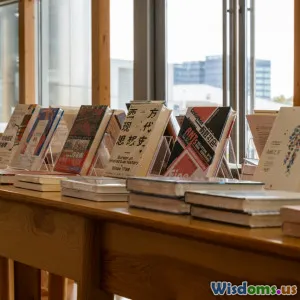
Comparing French Existential Novels To Russian Counterparts
15 min read Explore how French existential novels differ from Russian counterparts, revealing unique philosophical, cultural, and literary dimensions in both traditions. (0 Reviews)
French Existential Novels vs Russian Counterparts: A Deep Comparative Analysis
Introduction: A Tale of Two Traditions
Literature has long served as a mirror for humanity’s struggles with meaning, morality, and existence. Within the vast world of novels, two themes have repeatedly surfaced: the search for purpose, and the confrontation of the absurd. Few literary traditions have examined these more rigorously than the French existentialists and their Russian literary counterparts. But just how similar— or distinct— are the questions raised by Jean-Paul Sartre’s café dwellers compared to Fyodor Dostoyevsky’s haunted souls? And how do the turbulent histories and philosophies of twentieth-century France and nineteenth-century Russia infuse their writing?
This article takes you deep inside these two influential traditions. By juxtaposing their thematic obsessions, narrative styles, philosophical underpinnings, and legacy, you will emerge with a richer appreciation for the unique—and sometimes convergent—ways that French and Russian novelists have explored what it means to be human when certainty disappears.
Literary and Historical Contexts: The Roots of Existential Inquiry
French Existentialism: Born in Turmoil
The French existential novel crystallized in mid-20th-century Paris—a crucible of war, occupation, and intellectual ferment. Major proponents like Jean-Paul Sartre, Simone de Beauvoir, and Albert Camus inhabited the bohemian cafés and lecture halls of a France wrestling with the aftermath of two world wars. Existentialism, as articulated by Sartre’s dictum, "existence precedes essence," grew out of a broader disillusionment with traditional religion and political authority.
French existential novels—L’Étranger (The Stranger) by Camus, Sartre’s La Nausée (Nausea), and de Beauvoir’s L’Invitée (She Came to Stay)—often showcase ordinary people who confront overwhelming choices without guidance from God or social institutions. Existential terror and freedom combine, producing characters as liberated as they are anxious. Sartre himself declared:
"Man is condemned to be free; because once thrown into the world, he is responsible for everything he does."
Russian Predecessors: Existentialism Before Existentialism?
In Russia, the existential novel predates the French movement by several decades. Particularly in the works of Fyodor Dostoyevsky, Leo Tolstoy, and to a lesser degree Anton Chekhov, we see deep meditations on agency, faith, guilt, and the existence of evil.
The nineteenth-century Russian literary tradition—looming over the autocratic tsarist state, Orthodox Christianity, and the rumblings of revolution—explored existential questions, if not always by name. Dostoyevsky’s tortured characters often stand at the edge of reason, confronting moral and philosophical chasms. From Crime and Punishment to The Brothers Karamazov, these works forced Russian readers to wrestle with questions of responsibility, suffering, and the meaning of life with startling depth.
Famed Russian literary critic Vissarion Belinsky once noted:
“In Dostoyevsky, we see a new comprehension of human freedom and the sick soul's search for faith and salvation.”
Key Point:
- French existentialism emerges against the modern backdrops of war, urbanity, and philosophical skepticism; Russian existentialism is rooted in tsarist repression, religious tension, and a society on the brink.
Philosophical Divergences: Ethics, Meaning, and the Absurd
The French: Absurd Freedom
French existentialists, especially Camus and Sartre, are consumed by the notion of the absurd: the collision between humans’ craving for inherent meaning and the world’s indifferent silence. Instead of searching for absolute answers, French characters act in full knowledge of their freedom—and its terrifying, lonely corollary, responsibility.
For example, in The Stranger, Camus’s Meursault commits murder seemingly at the sun’s behest, reflecting a universe devoid of cosmic reason. In Nausea, Roquentin experiences profound disgust with the sheer facticity of existence, an alienation unmistakably modern.
This confrontation with absurdity leads to a particular ethics: authenticity. As Sartre asserted, “to act in bad faith” is to deny one’s freedom and responsibility. Existentialist French protagonists must create value solely from their actions in a world where there is no predefined morality.
Selected Example: Camus and Moral Rebellion
Camus posited the only serious philosophical question is whether to commit suicide, given life’s meaninglessness. However, his answer is “no”—one must rebel and create meaning within the absurd.
"> There is but one truly serious philosophical problem and that is suicide." – Albert Camus, The Myth of Sisyphus
The Russians: Suffering, Morality, and Transcendence
Whereas French existentialists typically reject metaphysical solutions, their Russian counterparts grapple obsessively with faith and transcendence. Dostoyevsky’s Raskolnikov (Crime and Punishment) murders in pursuit of a Nietzschean superiority, only to be crushed by guilt and inch towards redemption. In The Brothers Karamazov, Ivan Karamazov demands answers for evil—challenging God, only to endure existential torment.
These characters’ existential crises revolve not just around freed om but inescapable suffering and the possibility of salvation. Russian existential novels, influenced by Orthodoxy and a tradition of pilgrimage, often resolve their quests in either surrender to or rebellion against a higher power.
Selected Example: Dostoyevsky and the Problem of Evil
Dostoyevsky’s central question—"If God is dead, is everything permitted?"—haunts his fiction. His characters endlessly debate whether true morality can exist without divinity. The famous Grand Inquisitor chapter in The Brothers Karamazov is as much philosophy as fiction, directly posing this dilemma.
Synthesis or Divergence?
- In France: Freedom and authenticity trump faith; meaning must be invented.
- In Russia: Faith and redemption remain central; suffering becomes transformative.
Stylistic and Narrative Approaches: How the Story is Told
French Existential Style: Minimalism and Dislocation
French existential novels often mirror their philosophy with pared-down, clinical prose and urban settings. Camus’s sentences in The Stranger are famously dry, mirroring Meursault’s emotional detachment. Sartre’s Nausea uses interior monologue to spiral the reader into isolation, alienation, and the existential "nausea" of mere being.
"Mother died today. Or maybe yesterday, I don’t know." – The Stranger
Characters occupy an environment stripped of tradition—a deliberate echo of existentialist depersonalization.
Notable Techniques:
- Stream-of-consciousness: Showcases constant flux of self and doubt
- Dialogue-driven philosophy: Cafés, debates, and personal revelations are common
- Existential soliloquy: Reveals characters' struggles with authenticity
Russian Narrative Complexity: Polyphony and Psychological Realism
Russian existential novels are sprawling, multilayered, and dense. Dostoyevsky pioneered the polyphonic novel, where multiple viewpoints clash without a central authorial judgment. In The Brothers Karamazov, every brother personifies a different philosophical attitude, interacting in a web of argument and introspection.
The Russian tradition is rich in psychological realism. Characters are torn by inner divisions: Raskolnikov as both rational murderer and guilt-ridden penitent; Ivan as both rational skeptic and tormented soul.
Notable Techniques:
- Multiple narrators and voices: Diverse characters, each with philosophical validity
- Long interrogative dialogues: Debates on ethics, existence, and faith drive the plot
- Interweaving of plot and philosophical argument: Action is inseparable from ideas
Core Themes Compared: Confronting the Void
1. Alienation and the Outsider
- French Example: Meursault in The Stranger is ostracized not for his crime, but for his honest, unfeeling response to his mother’s death—an alienation from social norms.
- Russian Example: Dostoyevsky’s Underground Man (Notes from Underground) resists all social connection, lashing out at a world he cannot join or accept.
2. Guilt, Responsibility, and the Burden of Choice
- French: Characters must legislate their ethics from nothing, a weight that often results in paralysis (see Roquentin in Nausea).
- Russian: Responsibility is viewed through a cosmic or moral lens—Raskolnikov’s guilt is personal and universal, leading to confession and suffering as purification.
3. Hope, Despair, and the Possibility of Redemption
- France: Hope is self-generated, often fragile. Meaning arises in rebellion or authentic action, but cosmic despair is omnipresent.
- Russia: The possibility (if not the realization) of transcendence, forgiveness, and grace. Even in Ivan Karamazov’s bleakest moments, the question of God persists.
Authors and Their Philosophies: Embodiments of a National Spirit
The French Titans
- Jean-Paul Sartre: Advocated radical freedom and condemned “bad faith”—living according to societal roles rather than authentic choice.
- Simone de Beauvoir: Broadened existentialism to gender, examining the other as “woman,” and forging existential ethics in relation.
- Albert Camus: The absurdist who, though linked to existentialism, maintained a distinction: “I do not believe in God and I am not an existentialist,” he once claimed, emphasizing harmony with the absurd through defiant courage.
The Russians
- Fyodor Dostoyevsky: Known for dramatizing existential struggle as spiritual struggle. His exposure to Siberian hard labor darkened his themes and deepened his insights into suffering, redemption, and the abyss of freedom.
- Leo Tolstoy: Often associated with moral and religious crisis in his later novels (Anna Karenina, The Death of Ivan Ilyich).
- Ivan Turgenev and Anton Chekhov: Explored alienation and absurdity in quieter, more restrained voices.
Influence and Legacy: Beyond Borders
French existential novels have inspired generations of writers— from Samuel Beckett’s theater of the absurd to modernist and postmodernist fiction across the globe. Sartre’s rejection of preordained meaning resonated especially in postwar societies undergoing secularization and questioning inherited conventions.
Russian existential fiction, meanwhile, laid the groundwork for entire genres: the psychological novel, the political thriller, and literary explorations of totalitarianism—see Aleksandr Solzhenitsyn’s Gulag Archipelago or Vladimir Nabokov’s existential games. Dostoyevsky’s polyphony anticipated postmodern narrative forms, and his moral dilemmas continue to haunt writers exploring the dark night of the soul.
In the end, both traditions instilled a seriousness about literature as not just entertainment or self-expression, but as a battleground for the most urgent questions of human existence.
So, Which is More Relevant Today?
French existentialism’s radical freedom finds echoes in contemporary debates around identity, authenticity, and meaning in a globalizing, secularized world. Its stylistic minimalism and moral challenge appeal in a time of information overload and societal fragmentation.
Conversely, Russian existential novels’ confrontation with suffering, evil, and faith have regained immediacy amid rising political uncertainty, religious revival, and humanity’s ongoing search for solace amidst chaos.
Conclusion: Two Paths to the Abyss—And Beyond
Though evolving in different epochs and under distinct cultural pressures, French and Russian existential novels share a fascination with what happens when foundations fail—when humans must author their own meaning (or dare to believe in something beyond themselves).
- The French approach is urban, philosophical, and heroically individualist—a stark rendering of absurd freedom.
- The Russian approach is spiritual, psychological, and altogether more tortured—a theater of souls writhing before God or the void.
Ultimately, these novels—whether written in Parisian cafés or Saint Petersburg garrets—reveal human dignity in struggle. They call readers to look within and beyond, and in so doing, remain as urgent and unsettling as ever.
Further Reading and References:
- Camus, Albert. The Myth of Sisyphus.
- Sartre, Jean-Paul. Existentialism Is a Humanism.
- Dostoyevsky, Fyodor. The Brothers Karamazov, Notes from Underground.
- De Beauvoir, Simone. The Second Sex.
- Irwin, Alexander. Saints of the Impossible: Bataille, Weil, and Human Experience.
- Frank, Joseph. Dostoevsky: A Writer in His Time.
"Each tradition gives us not just answers, but ways to inhabit the questions themselves."
Rate the Post
User Reviews
Popular Posts

















